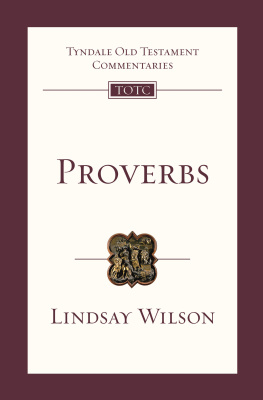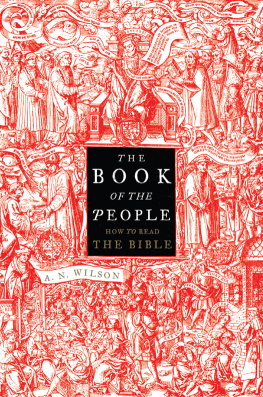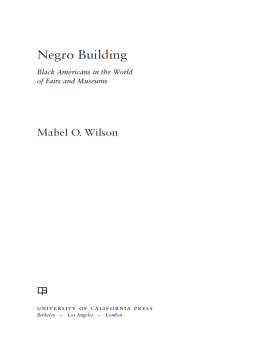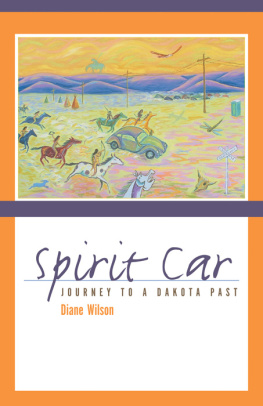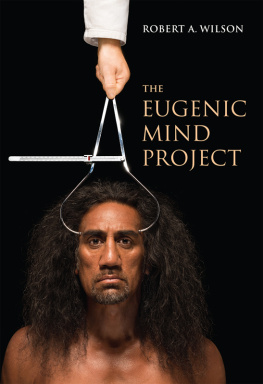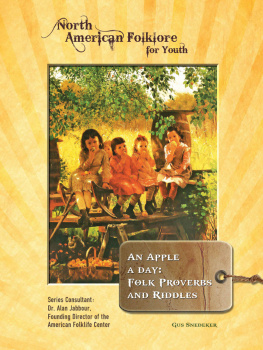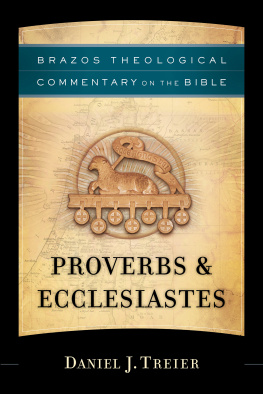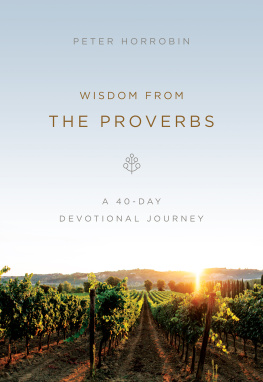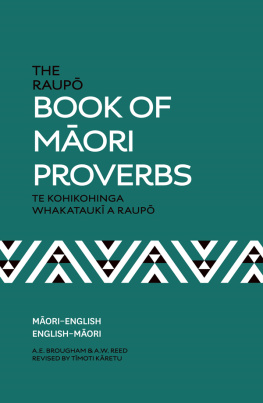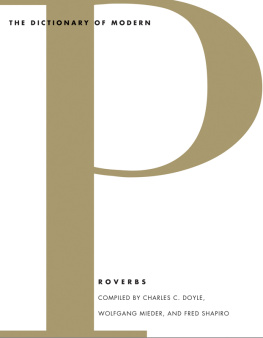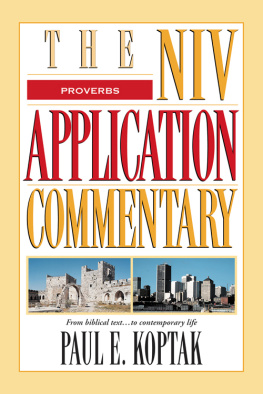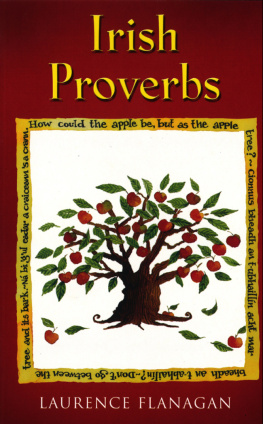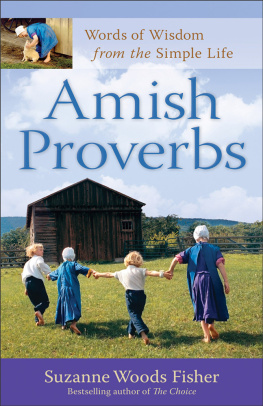Wilson - Proverbs
Here you can read online Wilson - Proverbs full text of the book (entire story) in english for free. Download pdf and epub, get meaning, cover and reviews about this ebook. year: 2018, publisher: InterVarsity Press, genre: Religion. Description of the work, (preface) as well as reviews are available. Best literature library LitArk.com created for fans of good reading and offers a wide selection of genres:
Romance novel
Science fiction
Adventure
Detective
Science
History
Home and family
Prose
Art
Politics
Computer
Non-fiction
Religion
Business
Children
Humor
Choose a favorite category and find really read worthwhile books. Enjoy immersion in the world of imagination, feel the emotions of the characters or learn something new for yourself, make an fascinating discovery.
Proverbs: summary, description and annotation
We offer to read an annotation, description, summary or preface (depends on what the author of the book "Proverbs" wrote himself). If you haven't found the necessary information about the book — write in the comments, we will try to find it.
Proverbs — read online for free the complete book (whole text) full work
Below is the text of the book, divided by pages. System saving the place of the last page read, allows you to conveniently read the book "Proverbs" online for free, without having to search again every time where you left off. Put a bookmark, and you can go to the page where you finished reading at any time.
Font size:
Interval:
Bookmark:
Dedicated to Clarissa, Her godly wisdom is an encouragement to me and many others. An excellent wife who can find? She is far more precious than jewels.
(Prov. 31:10)
The decision completely to revise the Tyndale Old Testament Commentaries is an indication of the important role that the series has played since its opening volumes were released in the mid-1960s. They represented at that time, and have continued to represent, commentary writing that was committed both to the importance of the text of the Bible as Scripture and a desire to engage with as full a range of interpretative issues as possible without being lost in the minutiae of scholarly debate. The commentaries aimed to explain the biblical text to a generation of readers confronting models of critical scholarship and new discoveries from the Ancient Near East, while remembering that the Old Testament is not simply another text from the ancient world. Although no uniform process of exegesis was required, all the original contributors were united in their conviction that the Old Testament remains the word of God for us today. That the original volumes fulfilled this role is evident from the way in which they continue to be used in so many parts of the world.
A crucial element of the original series was that it should offer an up-to-date reading of the text, and it is precisely for this reason that new volumes are required. The questions confronting readers in the first half of the twenty-first century are not necessarily those from the second half of the twentieth. Discoveries from the Ancient Near East continue to shed new light on the Old Testament, whilst emphases in exegesis have changed markedly. Whilst remaining true to the goals of the initial volumes, the need for contemporary study of the text requires that the series as a whole be updated. This updating is not simply a matter of commissioning new volumes to replace the old. We have also taken the opportunity to update the format of the series to reflect a key emphasis from linguistics, which is that texts communicate in larger blocks rather than in shorter segments such as individual verses. Because of this, the treatment of each section of the text includes three segments. First, a short note on Context is offered, placing the passage under consideration in its literary setting within the book, as well as noting any historical issues crucial to interpretation. The Comment segment then follows the traditional structure of the commentary, offering exegesis of the various components of a passage. Finally, a brief comment is made on Meaning , by which is meant the message that the passage seeks to communicate within the book, highlighting its key theological themes. This section brings together the detail of the Comment to show how the passage under consideration seeks to communicate as a whole.
Our prayer is that these new volumes will continue the rich heritage of the Tyndale Old Testament Commentaries and that they will continue to witness to the God who is made known in the text.
David G. Firth, Series Editor
Tremper Longman III, Consulting Editor
It was with some hesitation that I accepted David Firths kind invitation to write the replacement volume on Proverbs for the Tyndale Old Testament Commentaries series. I have personally found Derek Kidners volume very helpful, especially for his subject studies, and Derek himself was a wonderful wordsmith. They seemed very big shoes to fill, but it is now over fifty years since his Proverbs commentary appeared, based on the King James Version. Recent studies in Hebrew poetry, biblical theology and canonical readings of texts meant, however, that it was fitting for a new volume to be prepared. David has waited patiently for the completion of this project through some unplanned delays. His comments, observations and questions have always been gracious and helpful.
For me personally, it has been a worthwhile yet humbling experience, grappling in particular with the issues of structure in the sentence sayings, and working out how to make them more accessible to Christian believers in the contemporary world. At one level, proverbs sound like they are irredeemably old-fashioned, but in fact our world is full of their modern equivalents slogans, advertising jingles and bumper sticker mottos. So I thought to myself, Just do it! I believe that Proverbs is an important but neglected book, like the wider wisdom literature of which it is a foundational part. At a time when the church is increasingly marginalized, here is a book that speaks openly about those everyday realities of life (work, speech, money, the good life, friends, etc.) that are so significant for ordinary people in our society and in our churches. What rich resources there are here to equip believers with an important part of what they will need in order to live successfully in the twenty-first century in both the Western and the Majority World. The teaching of this book will cross cultural and national boundaries, and is still so clearly relevant. I have constantly been reminded of Gods goodness in his concern that every part of our lives needs to be shaped by his active kingly rule, even if his activity is behind the scenes. Proverbs helps us to explore what it means for God to care about every aspect of our daily lives.
Of course, such a project can never be undertaken as a solo adventure. Many have contributed some unaware and even unthanked to this book, although they are not to blame for its shortcomings. Students over many years, and in three continents, have not only listened to my thoughts on Old Testament wisdom, but also asked many challenging questions. I am grateful to my Old Testament teachers, especially Barry Webb and John Woodhouse, for encouraging my interest in this vital part of Gods word, and for my Old Testament colleagues at Ridley College in Melbourne over the last twenty-six years (Robin Payne, Paul Barker, Andrew Sloane, Andrew Reid, Andrew Abernethy and Jill Firth), as well as those lecturing in other areas. I particularly want to thank the four Principals at Ridley that I have worked under (Maurice Betteridge, Graham Cole, Peter Adam and Brian Rosner), for their personal and professional encouragement in many ways. I am grateful to the Board of Ridley College for granting several periods of study leave, during which time much of this book has been written. I continue to enjoy working within the fellowship of Australian College of Theology network, and I also would like to thank those who have interacted with my ideas at conferences in Australia, the United Kingdom, Asia and the United States. Iron sharpens iron (Prov. 27:17)! Those who have written on Proverbs before me have provided a rich source of possibilities and, at times, a correction to my overly speculative ideas. Librarians are Gods gifts to scholars, and I would like to thank Ruth Millard and Alison Foster for their friendly and professional assistance, which has helped greatly.
At a personal level, it is a great delight to dedicate this book to one who exemplifies its principles of wise, godly living in such an attractive way my wife Clarissa. My previous commentary was on the book of Job, and I did not want to dedicate that book to her as Jobs wife gets such bad press. The book of Proverbs, however, ends with a wonderful poem of a woman who demonstrates wisdom, the excellent wife of 31:1031, and so this seems like the ideal book to dedicate to Clarissa. You are an excellent wife... far more precious than jewels (31:10), and I am grateful to God for you. I also want to thank my now-adult children, Samara, David (and Tina), Melanie (and Tristan), for the richness they have added to my life over the years, together with our recent granddaughter, Aivie Wren.
Finally, I would like to express my gratitude to our great God, the Father of our Lord Jesus Christ. His persevering grace and constant love give me strength to keep on living for him day after day.
Next pageFont size:
Interval:
Bookmark:
Similar books «Proverbs»
Look at similar books to Proverbs. We have selected literature similar in name and meaning in the hope of providing readers with more options to find new, interesting, not yet read works.
Discussion, reviews of the book Proverbs and just readers' own opinions. Leave your comments, write what you think about the work, its meaning or the main characters. Specify what exactly you liked and what you didn't like, and why you think so.

